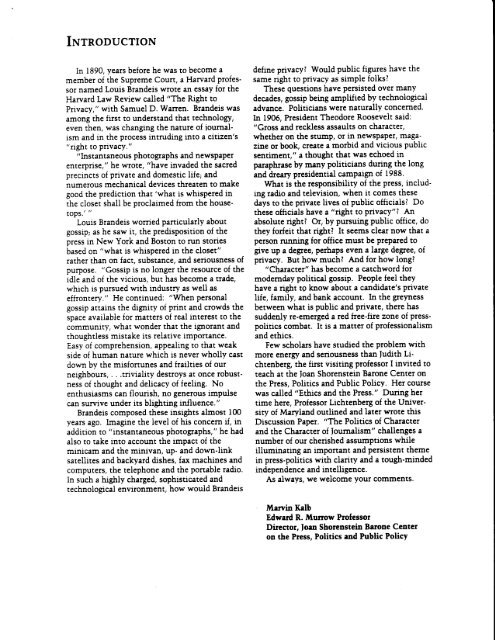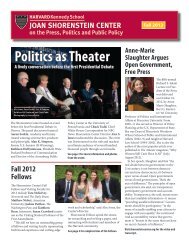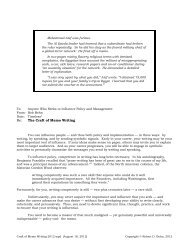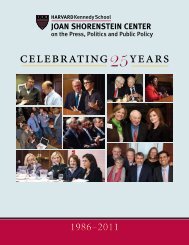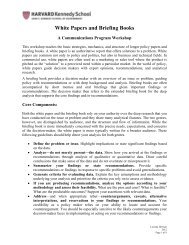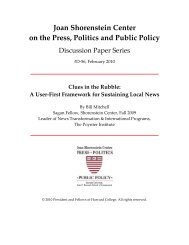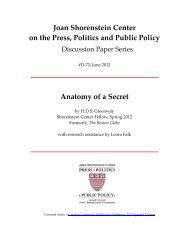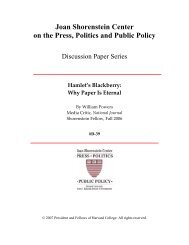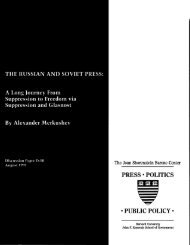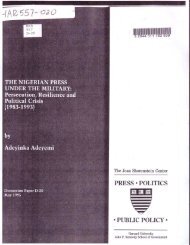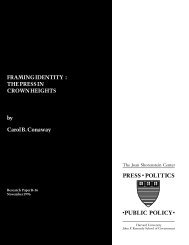PUBLIC POLICY - Joan Shorenstein Center on the Press, Politics ...
PUBLIC POLICY - Joan Shorenstein Center on the Press, Politics ...
PUBLIC POLICY - Joan Shorenstein Center on the Press, Politics ...
You also want an ePaper? Increase the reach of your titles
YUMPU automatically turns print PDFs into web optimized ePapers that Google loves.
Irurn<strong>on</strong>ucrloN<br />
ln 1890, years before he was to become a<br />
member of <strong>the</strong> Supreme Court, a Harvard profes'<br />
sor named Louis Brandeis wrote an essay for <strong>the</strong><br />
Harvard Law Review called "The Right to<br />
Privacy," with Samuel D. Warren. Brandeis was<br />
am<strong>on</strong>S <strong>the</strong> first to understand that technology,<br />
even <strong>the</strong>n, was changing <strong>the</strong> nature of iournal'<br />
ism and in <strong>the</strong> process intruding into a citizen's<br />
"right to privacy."<br />
"lnstantaneous photographs and newspaPer<br />
enterprise," he wrote, "have invaded <strong>the</strong> sacred<br />
precincts of private and domestic life; and<br />
numerous mechanical devices threaten to make<br />
good <strong>the</strong> predicti<strong>on</strong> that'what is whispered in<br />
<strong>the</strong> closet shall be proclaimed from <strong>the</strong> housetops.'<br />
"<br />
Louis Brandeis womed panicularly about<br />
gossip; as he saw it, <strong>the</strong> predispositi<strong>on</strong> of <strong>the</strong><br />
press in New York and Bost<strong>on</strong> to run stories<br />
based <strong>on</strong> "what is whispered in <strong>the</strong> closet"<br />
ra<strong>the</strong>r than <strong>on</strong> fact, substance, and seriousness of<br />
purpose. "Gossip is no l<strong>on</strong>ger <strong>the</strong> resource of <strong>the</strong><br />
idle and of <strong>the</strong> vicious, but has become a trade,<br />
which is pursued with industry as well as<br />
effr<strong>on</strong>tery." He c<strong>on</strong>tinued: "When pers<strong>on</strong>al<br />
gossip attains <strong>the</strong> dignity of pnnt and crowds <strong>the</strong><br />
space available for matters of real interest to <strong>the</strong><br />
communrty, what w<strong>on</strong>der that <strong>the</strong> ignorant and<br />
thoughtless mrstake its relative rmpoftance.<br />
Easy of comprehensi<strong>on</strong>, appealing to that weak<br />
side of human nature which is never wholly cast<br />
down by <strong>the</strong> misfortunes and frailties of our<br />
neighbours, . . .triviality destroys at <strong>on</strong>ce robust'<br />
ness of thought and delicacy of feeling. No<br />
enthusiasms can flourish, no generous impulse<br />
can survive under its bligbting influence."<br />
Brandeis composed <strong>the</strong>se insights almost 100<br />
years ago. Imagrne <strong>the</strong> level of his c<strong>on</strong>cem if, in<br />
additi<strong>on</strong> to "instantaneous define privacy? Would public figures have <strong>the</strong><br />
same nght to privacy as simple folks?<br />
These questi<strong>on</strong>s have persisted over many<br />
decades, gossip being amplified by technologrcal<br />
advance. Politicians were naturally c<strong>on</strong>cerned.<br />
ln 1905, President Theodore Roosevelt said:<br />
"Gross<br />
and reckless assaults <strong>on</strong> character,<br />
whe<strong>the</strong>r <strong>on</strong> <strong>the</strong> stump, or in newspaper, magazine<br />
or book, create a morbid and vicious public<br />
sentiment," a thought that was echoed in<br />
paraphrase by many politicians during <strong>the</strong> l<strong>on</strong>g<br />
and dreary presidential campaign of 1988.<br />
What is <strong>the</strong> resp<strong>on</strong>sibility of <strong>the</strong> press, including<br />
radio and televisi<strong>on</strong>, when it comes <strong>the</strong>se<br />
days to <strong>the</strong> private lives of public officials? Do<br />
<strong>the</strong>se officials have a<br />
photographs," he had<br />
also to take into account <strong>the</strong> impact of <strong>the</strong><br />
mrnicam and <strong>the</strong> minivan, up- and down-link<br />
satellites and backyard dishes, fax machines and<br />
computers, <strong>the</strong> teleph<strong>on</strong>e and <strong>the</strong> p<strong>on</strong>able radio.<br />
In such a highly charged, sophisticated and<br />
technological envir<strong>on</strong>ment, how would Brandeis<br />
"right to privacy"? An<br />
absolute right? Or, by pursuing public office, do<br />
<strong>the</strong>y forfeit that rigbt? It seems clear now that a<br />
pers<strong>on</strong> running for office must be prepared to<br />
give up a degree, perhaps even a large degree, of<br />
privacy. But how muchl And for how l<strong>on</strong>g?<br />
"Character" has become a catchword for<br />
modernday political gossip. People feel <strong>the</strong>y<br />
heve a right to know about a candidate's private<br />
iife, family, and bank account. In <strong>the</strong> greyness<br />
between what is public and private, <strong>the</strong>re has<br />
suddeniy re-emerged a red free-fire z<strong>on</strong>e of press'<br />
politics combat. It is a matter of professi<strong>on</strong>alism<br />
and ethics.<br />
Few scholars have studied <strong>the</strong> problem with<br />
more energy and seriousness than Judith Li'<br />
chtenberg, <strong>the</strong> first visiting professor I invited to<br />
teach at <strong>the</strong> loan <str<strong>on</strong>g>Shorenstein</str<strong>on</strong>g> Bar<strong>on</strong>e <str<strong>on</strong>g>Center</str<strong>on</strong>g> <strong>on</strong><br />
<strong>the</strong> <strong>Press</strong>, <strong>Politics</strong> and Public Policy. Her course<br />
was called "Ethics and <strong>the</strong> <strong>Press</strong>." During her<br />
time here, Professor Lichtenberg of <strong>the</strong> Uruver'<br />
siry of Maryland outlined and later wrote this<br />
Discussi<strong>on</strong> Paper. "The <strong>Politics</strong> of Character<br />
and <strong>the</strong> Character of Journalism" challenges a<br />
number of our cherished assumpti<strong>on</strong>s while<br />
illuminating an imp<strong>on</strong>ant and persistent <strong>the</strong>me<br />
in press-politics with clanty and a tough-minded<br />
independence and intelligence.<br />
As always, we welcome your comments.<br />
Manin Kalb<br />
Edward R. Illunow Professor<br />
Director, Ioan <str<strong>on</strong>g>Shorenstein</str<strong>on</strong>g> Bar<strong>on</strong>e <str<strong>on</strong>g>Center</str<strong>on</strong>g><br />
<strong>on</strong> <strong>the</strong> <strong>Press</strong>, <strong>Politics</strong> and Public Policy


